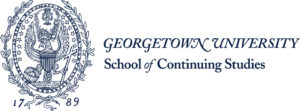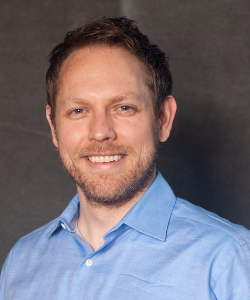
We will continue to anticipate industry needs and build courses to ensure students are coming out of the program equipped to excel in the communications industry.
After spending many years in the corporate communications realm, Cylor Spaulding turned his attention to teaching. As a faculty director at Georgetown University, Spaulding manages the graduate-level Public Relations and Corporate Communications program, where students are equipped with the skills needed to enter high-level careers in PR, nonprofits, government agencies, Fortune 500 companies, and more. Read on to hear Spaulding's take on Georgetown's offerings and how it can help students obtain the job of their dreams.

Tell us about your background?
Prior to going into higher education, I spent ten years in public relations agencies working with a variety of clients from independent brands to nonprofits and Fortune 500 companies. After receiving my Ph.D. from University of Miami, I was an assistant professor at Towson University for several years, and then moved to Georgetown University to take on the role of faculty director for the Public Relations & Corporate Communications master’s program. In addition to my work overseeing the program, I also present and publish research that focuses on public relations as it relates to history, religion, and the LGBT community. You can find my full bio here.
What differentiates your MIC (Masters in Communications) program from other schools?
Georgetown’s graduate program in Public Relations & Corporate Communications is an applied program in every sense. The majority of the faculty in the program are adjuncts who currently work in the industry and are experts in the area in which they are teaching. Additionally, all the courses are geared toward working adults, with the on-campus courses offered in the evenings, while the online courses allow students to work ahead and over weekends. Students also take a Capstone course instead of completing a thesis or comprehensive exam. In that course, students are asked to complete a comprehensive communications plan from start to finish for a real client to demonstrate all the skills they have learned throughout their time in the program. Students also have the option to take some classes in other programs within the school to tailor their experience to their interests even more.
Talk to us about the class sizing and curriculum of the MIC offering?
All of the on-campus courses are capped at 20 students, while the online courses are capped at 17 students. The Public Relations & Corporate Communications program is 30 course credits, and there are five courses students are required to take: Elements of Communications Planning, Conversations in Ethics, Public Relations Writing, Communications Research, and the Capstone course. Those courses total 15 credits, so students will be able to take 15 credits of elective classes, which generally translates to five courses. The elective courses in the program fall into the areas of social impact, digital, corporate communication, and general public relations strategic development courses. The variety of electives allows students to take the classes that most interest them or toward the skill sets they think will be most useful in their career.
Why should a student come to your school to get their Public Relations & Corporate Communications Masters?
In addition to the innovative courses our program offers, our students benefit from the robust communications industry located in the heart of Washington, D.C. From agencies, to corporations, to nonprofits, to associations, there are myriad opportunities for students to intern or be employed in positions that will utilize the skillsets they learn in the program. Additionally, the School of Continuing Studies’ downtown D.C. campus is easy to get to. Students may also take advantage of groups and events on Georgetown’s main campus, including the impressive roster of speaking engagements the University attracts.
From agencies, to corporations, to nonprofits, to associations, there are myriad opportunities for students to intern or be employed in positions that will utilize the skill sets they learn in the program.
What job related industries are your students focusing on post-graduation?
Students who complete this degree work in the communications field in a variety of sectors, such as agency, government, nonprofit, association, and corporate. Examples of job titles held by our students and graduates include:
- Communications Associate, NPR
- Change and Communications Manager, The Coca Cola Company
- Digital Account Executive, Weber Shandwick London
- Social Media Brand Manager, Capital One
- Communications Director, U.S. House Homeland Security Committee
- Public Affairs Officer, U.S. Army
What type of internships does your program provide?
Many of our students are already employed, but we do provide internship courses for those students who are not but want to gain experience. Students must find internships on their own, but the program constantly provides updated lists of available jobs and internships for students. Many of these positions come directly from faculty or program contacts within the industry, so we are able to make introductions for the students.
Tell us about your faculty. What are the characteristics do you focus on to lead your programs?
Almost all of our faculty are adjuncts who are currently working in the communications industry. We look for experts in each particular course area to develop and teach each of the classes we offer. For example, the faculty who teach our Digital Analytics and Measurement courses oversee analytics functions for major organizations like National Geographic and the World Bank.
Benefits for students pursuing online MIC as opposed to on campus?
Whether pursuing online or on-campus coursework, students are taught by faculty who are industry experts. Our online courses mirror the subject areas that our on-campus classes cover. The online courses do allow students to take courses from areas outside of the Washington, D.C., area, including internationally. Additionally, the online courses allow students quite a bit of flexibility in terms of completing coursework. Many of the classes give students the opportunity to work ahead, and the live, virtual sessions with the instructors are all recorded in the event a student cannot attend in real time. Students will also have access to the same resources as the on-campus students, including the Writing Lab and the Georgetown University libraries.
Online Programs - Prospective students may worry online education sacrifices personalized learning for convenience. How do online schools support students, particularly within self-directed programs? What can instructors do to ensure students feel connected?
There is certainly a level of self-direction within all online programs. All of our online students are encouraged to participate in the live virtual sessions with the instructors, and the instructors also make themselves accessible by holding online office hours (either scheduled or by appointment). Various assignments also encourage students to interact with their peers.
What is the goal for the Public Relations & Corporate Communications program? Where do you see it in the next 5 years?
The Public Relations & Corporate Communications program is always evolving to meet industry needs and student interests. Recently, we have focused on building out more corporate communications courses—a result of student feedback. Similarly, the five required courses are a result of our conversations with industry professionals about what skills they look for when hiring candidates. We will continue to anticipate industry needs and build courses to ensure students are coming out of the program equipped to excel in the communications industry.
What geographical outreach does your program have? Are your students more local? Out of state?
While 60 percent of the student population is located in the local D.C., Virginia, and Maryland area, we have students that are based throughout the United States and the world. For example, we have students located in California, Texas, Michigan, Tennessee, Utah, Switzerland, Egypt, Peru, and Japan.
Georgetown Public Relations & Corporate Communications Program Quotes

“I continue to be impressed with the caliber of students in the Georgetown Master's program in Public Relations & Corporate Communications. The students come from highly diverse backgrounds with excellent professional and real-life experience that they bring to the classroom.” - Fran Bernhards, Faculty
 “The applied curriculum and real-world client work exposed me to what being an independent consultant could be like, and it gave me the confidence to go for it. I use the PRCC strategic planning model with all of my clients, and I think back to things taught in classes like Social Media, Media Relations, SEO, Cause Consulting, and even Ethics on a regular basis.” - Jessica Rice, Student
“The applied curriculum and real-world client work exposed me to what being an independent consultant could be like, and it gave me the confidence to go for it. I use the PRCC strategic planning model with all of my clients, and I think back to things taught in classes like Social Media, Media Relations, SEO, Cause Consulting, and even Ethics on a regular basis.” - Jessica Rice, Student
RELATED DEGREE OPTIONS:
